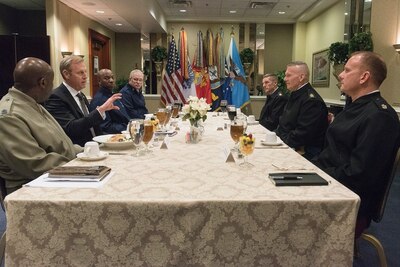By Lisa Ferdinando DoD News, Defense Media Activity
WASHINGTON, Nov. 27, 2017 — The military’s top enlisted
advisor said today that on the worst day of his military career, he knew he was
in good hands with the U.S. armed forces.
“We were pinned down, under fire, and when [we] called for a
quick reaction force, I was not worried about what race, what gender, or who
the other person was on the other end,” Army Command Sgt. Maj. John Wayne
Troxell recalled about the events of July 19, 2007.
That day, his patrol came under attack in Iraq; one of his
soldiers, Army Cpl. Brandon Craig, was killed, and another was severely
wounded.
“I just knew there was an American voice on the other end
that said ‘sergeant major, we’re coming to get you’ -- and that’s the bottom
line, and that’s why the U.S. armed forces is what it is today,” he said.
Troxell and the enlisted service chiefs spoke at a Pentagon
press briefing following the first day of meetings for the Defense Senior
Enlisted Council -- an annual executive-level conference to address issues
impacting the joint enlisted force.
Discussions on Enlisted Force
Troxell was joined by Sgt. Maj. of the Army Daniel A.
Dailey; Sgt. Maj. of the Marine Corps Ronald L. Green; Master Chief Petty
Officer of the Navy Steven S. Giordano; Chief Master Sgt. of the Air Force
Kaleth O. Wright; and Master Chief Petty Officer of the Coast Guard Steven W.
Cantrell.
“It’s an incredible opportunity for all of us to be here
today all at one time to talk about the backbone of our armed forces -- that
being our enlisted force,” he said.
Discussions included policy, enlisted leader development and
personnel readiness, which includes the manning, equipping and training of
forces, especially under the ongoing budgetary constraints, he said.
Despite budgetary and other challenges, the U.S. armed
forces remain the world’s premier fighting force, the sergeant major said.
“From an overall perspective, we can say that our U.S. armed
forces are always ready to fight and win our nation’s wars,” Troxell said, “but
readiness under a resource-constrained environment takes its toll over the
years.”
Members across the total force feel the budget constraints,
he said. A takeaway from his conversations with troops around the globe is that
consistency and predictability -- whether in pay and entitlements, or training
and operational deployments -- are factors in keeping morale high.
Despite the challenges, the military is always ready to
fulfil its commitments to the nation, he said.
“We absolutely still, as a U.S. armed force, can defend our
homeland and our way of life. We can absolutely meet our alliance commitments
and support our partners,” Troxell said. “We absolutely have warfighting
advantages in every warfighting domain, specifically in the human domain.”
The services are tasked with the monumental job of manning,
training and equipping the force to perform warfighting, peacekeeping and
humanitarian tasks, he said.
“Our nation depends on our ability to be in the right place
at the right time with the right qualities and capacities to protect our
nation,” he said.
Human Domain Advantage
The men and women who serve, Troxell said, are the most
important aspect of the armed forces.
“We know that without a doubt our people are not only our
most valuable resource but they are also our greatest competitive advantage
when it comes to fighting and winning our nation's wars,” he said.
Further, how the military educates, develops and empowers
its enlisted leaders will be the decisive factor in accomplishing the missions
the country asks of the military, the sergeant major said.
Troxell and the combatant command senior enlisted leaders
are scheduled to hold a news briefing tomorrow, with a focus on joint
operations, global integration and international partnerships.









No comments:
Post a Comment